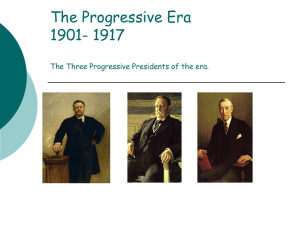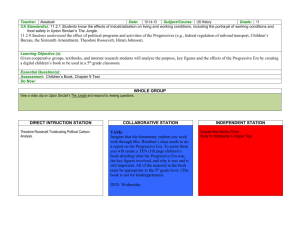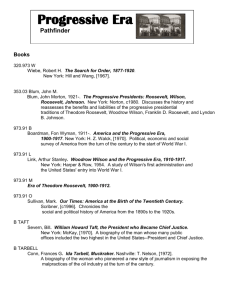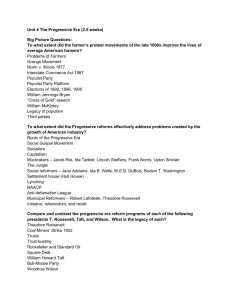The Progressive Era
advertisement
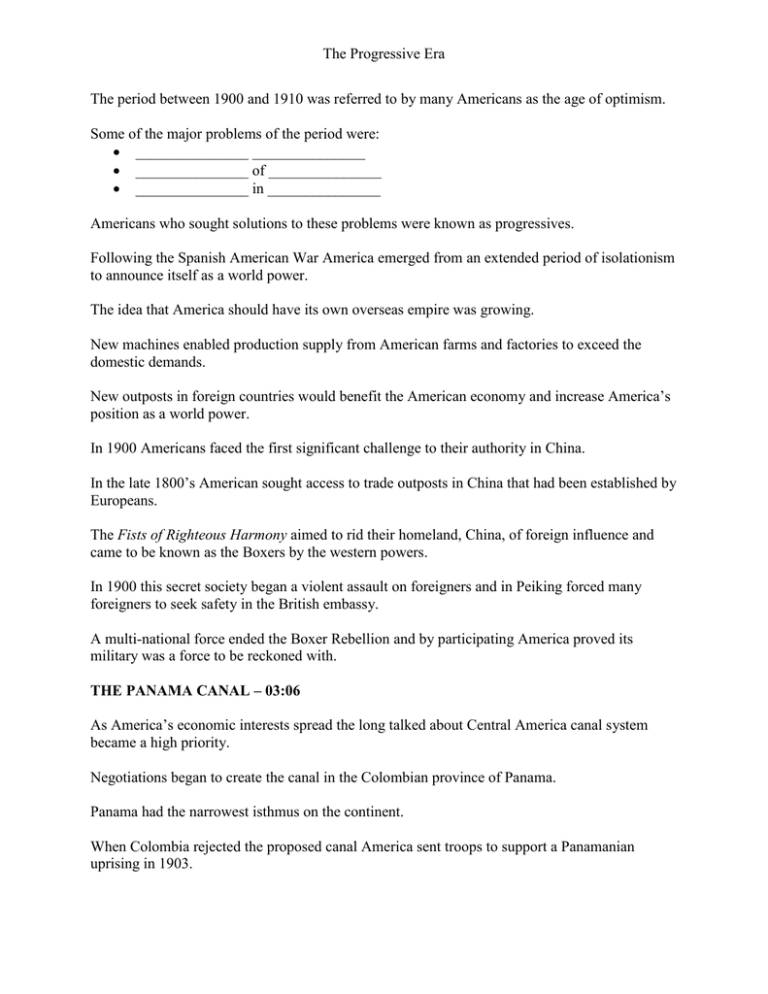
The Progressive Era The period between 1900 and 1910 was referred to by many Americans as the age of optimism. Some of the major problems of the period were: _______________ _______________ _______________ of _______________ _______________ in _______________ Americans who sought solutions to these problems were known as progressives. Following the Spanish American War America emerged from an extended period of isolationism to announce itself as a world power. The idea that America should have its own overseas empire was growing. New machines enabled production supply from American farms and factories to exceed the domestic demands. New outposts in foreign countries would benefit the American economy and increase America’s position as a world power. In 1900 Americans faced the first significant challenge to their authority in China. In the late 1800’s American sought access to trade outposts in China that had been established by Europeans. The Fists of Righteous Harmony aimed to rid their homeland, China, of foreign influence and came to be known as the Boxers by the western powers. In 1900 this secret society began a violent assault on foreigners and in Peiking forced many foreigners to seek safety in the British embassy. A multi-national force ended the Boxer Rebellion and by participating America proved its military was a force to be reckoned with. THE PANAMA CANAL – 03:06 As America’s economic interests spread the long talked about Central America canal system became a high priority. Negotiations began to create the canal in the Colombian province of Panama. Panama had the narrowest isthmus on the continent. When Colombia rejected the proposed canal America sent troops to support a Panamanian uprising in 1903. The Progressive Era Shortly after the successful uprising Panama became its own country and shortly thereafter Panama gave the United States the right to build and operate the canal. The canal was opened in 1914. The result of the promise of faster shipping to ever increasing foreign markets was more industrialization. As the nation’s business men rushed to fill the need for growing products three distinct problems were becoming increasingly apparent. The capitalist system upon which America was thriving was based in large part on the idea of competition. Fair competition between companies was seen as an insurance that prices would be kept low and quality would remain high. In 1890 the Sherman Anti-Trust Act had been passed in an effort to prevent the growth of monopolies and trusts which occur when one company controls every aspect of production and distribution of a specific product. The anti-trust laws had been weakened by Supreme Court rulings and many businesses were able to create monopolies by the turn of the century. With little to no competition these trusts were able to set their own prices and consumers were force to pay whatever was demanded of them. Another end result of industrialization was the concentration of the nation’s wealth into fewer and fewer hands. The factory workers of the early 1900s often faced long hours, low pay and unsafe working conditions. Many of these workers had immigrated from other countries and while working condition in America were often better than in Europe they were still horribly lacking in many areas. As few laws existed enforcing fair treatment of laborers factory owners and managers often treated their employees as lowly parts of machines. Working 10 to 12 hour days for work weeks that often stretched 6 to 7 days, factory laborers were routinely worn out or ill from over work. Added to the stress of long hours and pay as low as a dollar fifty a day was the often unsafe factory conditions. The Progressive Era Factories were often _______________, ________ _______, ________ _______ and ________ _______. When combined with massive, complicated machines the condition often allowed for on the job injuries and even the occasional death. The accident rate in Americans factories, mines and railroads was higher than for any other industrialized nation. Cities were so crowded that replacing an injured worker was easy for employers: if you couldn’t work some else could easily take you place. Business owners could often get away with paying their laborers the bare minimum since there was always another man who would do the job for less. The terrible working conditions also aided the spread of disease. Workers often brought their illnesses home to their unsanitary living conditions in the over crowded city slums. As of 1900, politicians had yet to address the problems of overpopulation in the poorest neighborhoods of the nation’s cities. No standards existed for building or maintaining apartment buildings and unethical landlords would force large families to cram into tiny one or two room apartments often with no restrooms and few windows. For the poor and immigrant populations it was often necessary to have all member of the family contribute what they could to help make ends meet. While men toiled over heavy machinery and women often found work sewing in clothing factories worst of all was child labor. Laws aimed at protecting young children from factory work they were rarely enforced. Accidents were more common among the _______________ _______________ who were force to work the same dangerous machinery as _______________ workers _______________ their _______________. The situation was dire but there was little incentive for factory owners to change their ways. As long as labor was cheap and in large supply their profits would continue to grow. PROGRESSIVISM – 08:48 As industrialization spread the problems associated with it became harder and harder to ignore. The Progressive Era Some members of the middle and upper classes saw the dreadful way the poor lived and wanted to do something about it. Many Americans did not know how bad the situation in factories and slums were until they read about it in the books and newspaper articles written by a group of writers who would eventually be called the Muckrakers. Muckrakers wrote specifically about the unfair business practices of the Standard Oil Trust, political corruption in the nation’s big cities, ranchers’ struggles with corporate railroads and unsafe and unsanitary practices of the meat packing industry. Most Progressives were native born, college educated, middle and upper class city dwellers. Progressives sought immediate reforms hoping to change society for the better while preserving capitalism and democracy. Theodore Roosevelt, who gave the Muckrakers their name, felt they were necessary but also felt the often went too far focusing solely on the negative aspect of the subject about which they wrote. Theodore Roosevelt was a know enemy of political corruption. No sooner had Roosevelt been sworn in than he delivered an address to congress stating the old laws and customs were no longer sufficient in the face of new social problems facing the United States. Roosevelt set out to convince the American people of a need for _______________ change and gained support for his strategy – a strategy he call the _______________ _______________. THE SQUARE DEAL – 11:15 Roosevelt first went after monopolies where he could. The existing anti-trust laws stated that businesses that were not involved in interstate commerce were not under the control of the federal government. Roosevelt first set his sights on railroads since they were involved in interstate commerce. Roosevelt succeeded in breaking up some of the railroad monopolies such as Northern Securities which had been combining their forces to raise the cost of shipping. The Supreme Court ordered Northern Securities dissolved in 1904. Swift and Company was the beef trust which had been combining to set high prices for cattle. The Progressive Era Roosevelt also won major victories against the tobacco and oil trusts. In all the Roosevelt administration brought 44 anti-trust cases before the Supreme Court. Though not always victorious, Roosevelt sent a powerful message to big business with his antitrust cases. Roosevelt also dislike the fact that government usually favored business over strikers when there were labor disputes. In 1902 Roosevelt got involved when the United Mine Workers went on strike when workers sought shorter working hours and higher wages. When the United Mine workers struck in 1902, mine owners halted operations hoping to wait out the strikes until laborers could no longer afford to picket. Most homes at the time were heated by coal and a lack of coal would drive up prices and hurt many Americans financially. In the hopes of settling the strike and averting national crises Roosevelt called the union leaders and mine owners to a conference at the White House. Mine owners refused to talk to union representatives. Roosevelt grew impatient and threatened to have the army take control of the mines prompting the mine owners to give the strikers what they wanted. This action marked an historic precedent – the first time a _______________ _______________ on the side of _______________ making Roosevelt popular with a population that saw him as a president willing to _______________ for their _______________ and as a result Roosevelt easily won re-election in 1904. In addition to his trust busting Roosevelt also sought new legislation that would prevent new trusts from forming. The Hepburn Act of 1906 increased the strength of the Inter-State Commerce Commission giving the ICC the power to set railroad freight rates. Roosevelt also sought reforms in the way food and drugs were prepared and marketed. Prior to the Pure Food and Drug Act the patent drug industry was booming despite the fact that the cure-all remedies that were marketed were often little more than alcohol and coloring that usually did more harm than good. In 1904 Pelican Island in Florida became the first national wildlife preserve. The Progressive Era Of all the reforms Roosevelt oversaw as president he was proudest of his work in conservation. When Roosevelt decided not to run for president in 1908 he threw his support behind William Howard Taft who had promised to continue Roosevelt’s progressive policies. THE PROGRESSIVE PARTY – 16:25 The biggest difference between Roosevelt and Taft was conservation: Taft was much more conservative. Taft refused to enact much in the way of new conservative legislation and Roosevelt felt Taft had betrayed him. In 1912 Roosevelt ran for president against the Republic Taft and the Democrat Wilson on the Progressive Party ticket which came to be known as the Bull Moose Party after Roosevelt made a statement about the party roaring like a bull moose. While Roosevelt won more votes than Taft his campaign actually split the Republican vote and allowed Woodrow Wilson to win the election. THE WILSON ADMINISTRATION – 17:40 Wilson, in terms of his conviction, determination and commitment to progressive causes, was very much a president in the Roosevelt tradition. Wilson fought to lower tariffs. In 1913 the Underwood Tariff Act was passed eliminating taxes on food, iron and wool and dramatically reduced taxes on many other items. The reduced tariffs decreased revenue for the federal government so in 1913 Congress enacted the first income tax as provided as provided for by the XVI Amendment to the Constitution. The Income Tax marked a change in the way the federal government generated revenue. Also in 1913 the XVII Amendment to the Constitution was ratified providing for the direct election of US Senators who had previously been appointed by state legislatures. Under Wilson a more _______________ _______________ was extended to the American people in the form of _______________, _______________ and _______________. _______________ gave the voters the right to _______________ _______________. _______________ allowed for the _______________ or _______________ of legislation. The Progressive Era _______________ enabled voters to _______________ an _______________ _______________ from _______________ by _______________ _______________. Wilson also attacked the banking trust by stripping it of its power. The Owen-Glass Act created the Federal Reserve System. The Federal Reserve System established a central federal bank and twelve regional banks that were under the control of a Federal Reserve Board. The Federal Reserve Board controlled inflation by setting interest rates and adjusting the supply of money which placed the power of banking at the federal level. The Federal Trade Commission to investigate corporations and put a halt to unfair business practices. The Clayton Anti-Trust Act passed in 1914 which strengthened the Sherman Anti-Trust Act by legally forbidding what were called interlocking directories meaning that corporate heads could not control more than one company in the same or related fields where they might be able to create monopolies and fix prices. The Clayton Anti-Trust Act legalized striking and boycotting giving a big boost to labor unions which previously had been seen as a threat to American capitalism. Two unions boosted large memberships and considerable sway over laborers: the Conservative American Federation of Labor and the radically socialist International Workers of the World. THE TRIANGLE SHIRTWAIST FIRE – 20:44 The Triangle Shirtwaist Factory was located in New York city. When a fire broke out at the factory in 1911, 146 of 500 women employees died because of negligence on the part of the management and unsafe working conditions were to blame. To keep the women working at their sewing machines all day the management locked the doors that led to the exits. Many women died when the fire escape collapsed: many other jumped and were killed as they attempted to avoid being burned. The owners of the factory were tried and acquitted on charges of man-slaughter. Women, in 1911, were seldom allowed to join labor unions and work place reforms often did little for women. The Progressive Era Progressive Reforms usually ignored problems of racial, ethnic and religious persecution: with little help from the government, minority groups had to seek reform for themselves. WOMEN IN THE PROGRESSIVE ERA – 22:15 At the turn of the 20th Century women were still considered second class citizens who, in most states, lacked the right to vote, make legal decisions and own property. Married women were expected to stay at home and be full time wives and mothers. The Suffrage movement and women’s groups seeking the right to vote were re-vitalized by the Progressive spirit. The XIX Amendment to the Constitution ratified in 1920 gave women the right to vote on a national level. Another cause supported by women was the complete ban on the manufacture and sale of alcohol, the temperance movement. IMMIGRATION IN THE PROGRESSIVE ERA – 23:44 New immigrants mostly from southern and eastern Europe brought many Catholics and Jews to America. These new immigrants brought with them different languages and religions which made assimilation difficult. Progressives did little to help the immigrants because of public dislike. The only help new immigrants received was in the form of settlement houses. Settlement houses helped immigrants learn English and American customs Asian immigrants were completely left out of Progressive policies. In 1902 Congress passed a law effectively ceasing immigration from China. American’s conservative newspapers called Asians the yellow peril. African-Americans in the Progressive Era – 25:34 Progressives also failed to seek reforms that would benefit African-Americans. Blacks were frequently forbidden to join labor unions and were unable to benefit from higher wages and safer working conditions. The Progressive Era President Wilson supported segregation and black and white federal workers had to use separate restrooms. It became apparent that if _______________ _______________ wanted better treatment it would have to come from within _______________ _______________. Booker T. Washington founder of the Tuskegee Institute which trained African-Americans for trades and agricultural jobs. During Washington’s speaking tours he sought the respect of white America. Washington accepted segregation but taught that through hard work and good moral character African-Americans could earn respect and gain equality. Washington’s words did not set well with many Americans including many within his own community. Washington’s willingness to accept segregation and his failure to demand even the most basic civil rights came under intense scrutiny from a man who would become one of the most important civil rights leaders of the century, W. E. B. DuBois. DuBois was the first African-American to earn a doctorate from an American university. In 1909 Dubois helped found the National Association for the Advancement of Colored People. Editing the NAACP’s newspaper Crisis Dubois stressed that blacks should take pride in themselves and demand their civil rights rather than willfully allow those rights to be stripped away. Blacks also made progress in the realm of popular music – blues and ragtime were two of the most important music genres of the day. Blues evolved from the slave songs and field hollers common in the south. TECHNOLOGY IN THE PROGRESIVE ERA – 28:06 The Progressive Era saw impressive advancements in technology and _______________. The Ford Model T caused a revolution in transportation. Ford’s use of the _______________ _______________ would revolutionize production. In 1915 D. W. Griffith’s Birth of a Nation debuted in theaters. Birth of a Nation claimed to be a history of the United States and contained obvious racist overtones. The Progressive Era By the end of the Progressive Era, 50% of American homes had electricity. The increased use of electricity also brought about an increase in the use of the _______________. THE END OF THE PROGRESSIVE ERA – 30:44 President Wilson won re-election by promising to keep American out of the war in Europe. As Germany conducted unrestricted submarine warfare sinking ocean liners and cargo ships with US citizens aboard it became apparent Wilson would have to go back on his word. As America entered the war in Europe the Progressive Era faded as the attention of the nation became more focused on what was going on in Europe than what reforms were left to compete at home. _______________ _______________ _______________ ended the Progressive Era.


